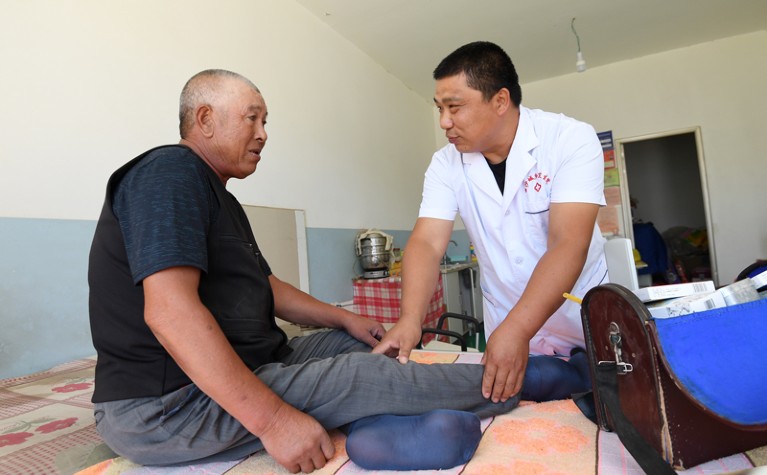Super Agers: An Evidence-Based Approach to Longevity Eric Topol Simon & Schuster (2025)
Super Agers, by clinician Eric Topol, has just been published, but it was almost surreal for me as a US scientist to read the book now, with its optimistic take on the state of the medical field. Despite their extreme promise, many of the lines of research that Topol describes have been subject to funding cuts by the Trump administration since the book was written.
For example, although Super Agers argues that we are on the verge of treating a host of diseases — from viral infections, such as influenza, HIV and rabies, to tuberculosis and several types of cancer — using the mRNA technology underlying COVID-19 vaccines, that sort of research is now on the chopping block in the United States.
The research aiming to keep people healthier for longer
Nevertheless, Topol has assembled an admirable and comprehensive review of cutting-edge approaches to tackling many illnesses that cut human lives short. He explains each disease and the current state of treatments — including an impressive overview of ongoing and recently completed clinical trials — and explores future possibilities. These include advances in CRISPR gene editing and stem-cell techniques aimed at treating blood disorders, cancers, Alzheimer’s disease and more. He covers an immense amount of material in an accessible manner, and has well-supported recommendations for readers.
Many of the diseases covered — obesity, diabetes and cardiovascular disease, for example — might not be considered ‘ageing’ by non-specialists. But Topol, like most researchers in the field, argues that anything that decreases life expectancy and quality of life is a facet of ageing, and should be addressed medically.
Many popular-science books about ageing and longevity focus on either personal stories or self-help suggestions. By contrast, this book is light on anecdote. Topol — a trained cardiologist at Scripps Research Translational Institute in La Jolla, California, who has been interested in human ageing for several decades — uses his own clinical experience to describe the progress and outstanding challenges in a range of health issues. Given this background, it is no surprise that the author focuses on chronic diseases.
Topol is particularly bullish on GLP-1 agonists: the blockbuster diabetes and obesity drugs, such as semaglutide (sold as Ozempic), that have shown benefits for not just these diseases, but also a surprising set of healthspan-shortening conditions. Calling them “one of the most life-changing medicines in history”, he explains that GLP-1 agonists have positive effects on liver disease, kidney disease, cancer and fertility. Some hope that the drugs might help to treat dementia, Parkinson’s disease and Alzheimer’s disease.
Lifestyle factors
He also touches on a few facets of human ageing that are less easily studied in animal models, namely the importance of outlook, social interactions and the impact of mental health. Topol points out that the “wellderly” population (people who are more than 80 years old and very healthy) have little in common at the genetic level, but are very active and socially engaged.
Forever young: what science can and can’t tell us about cheating ageing
The author offers two examples — Mrs L. R., a 98-year-old ‘healthy ager’, and Mr R.P., who is also 98 but has greatly benefited from advances in medicine — to illustrate his larger messages about the value of human interactions and medical progress. Longer lives might be achieved either through random good luck, resiliency and a sunny disposition (as with Mrs L. R.) or through current state-of-the-art medical treatments (Mr R.P.).
As with any work on lifespan and healthspan, Topol’s book summarizes current knowledge about the impact of diet, but he notes the lack of true randomized clinical trials exploring how diet affects longevity. He offers some advice that counters messages from other longevity gurus — pointing out, for example, that the high protein intake that others have recommended, with little solid evidence, might be associated with inflammation. Otherwise, the information is consistent with much of what can be found elsewhere, just with solid clinical support. And of course, exercise is covered, too. For example, he notes that, with his own growing awareness of research on exercise and ageing, his advice to patients as a cardiologist has shifted from emphasizing aerobic conditioning, instead highlighting the importance of strength, resistance and balance training to reduce the risk of age-related diseases.

Although some people are naturally healthy agers, others rely on medical treatments.Credit: CFOTO/Future Publishing/Getty
Topol notes with some frustration that diagnostic tests that could accelerate treatments have often not been adopted broadly. For instance, a clear point of exasperation is that metagenomics — an approach to rapidly uncover the source of an infection — is not used widely. Although some procedures that might diagnose, cure or treat diseases have not become normal in clinical practice owing to high costs, others might simply require changes to standards and training.




